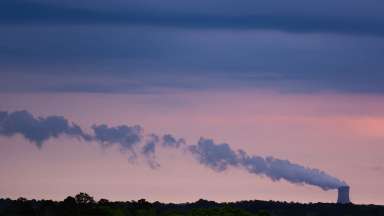Jump To:
Nuclear power plants use the heat generated from nuclear fission in a contained environment to convert water to steam, which powers generators to produce electricity. Although the construction and operation of these facilities are closely monitored and regulated by the Nuclear Regulatory Commission (NRC), accidents are possible. An accident could result in dangerous levels of radiation that could affect the health and safety of the public living near the nuclear power plant.
Risks from nuclear power plant emergencies
- Radiation sickness
- Fires and explosions
Nuclear power plants operate in most states in the country and produce about 20 percent of the nation’s power. Nearly three million Americans live within 10 miles of an operating nuclear power plant. The Shearon Harris Nuclear Power Plant in New Hill, N.C., is less than 25 miles from downtown Raleigh.
Before a nuclear power plant emergency
The following are things you can do to protect yourself, your family and your property from the effects of a nuclear power plant emergency:
- Obtain public emergency information materials from the power company that operates your local nuclear power plant or your local emergency services office. If you live within 10 miles of the power plant, you should receive the materials yearly from the power company or your state or local government.
- Sign up for emergency updates, if available, from your local emergency management agency to receive timely and specific information for your area.
During a nuclear power plant emergency
If an accident at a nuclear power plant were to release radiation in your area, local authorities activate warning sirens or other approved alert methods. They also instruct you through the Emergency Alert System (EAS) on local television and radio stations on how to protect yourself.
- Follow the EAS instructions carefully.
- Minimize your exposure by increasing the distance between you and the source of the radiation. This could be evacuation or remaining indoors to minimize exposure.
- If you are told to evacuate, keep car windows and vents closed; use re-circulating air.
- If you are advised to remain indoors, turn off the air conditioner, ventilation fans, furnace and other air intakes.
- Shield yourself by placing heavy, dense material between you and the radiation source. Go to a basement or other underground area, if possible.
- Stay out of the incident zone. Most radiation loses its strength fairly quickly.
After a nuclear power plant emergency
- Stay tuned to local radio or television stations for the latest emergency information.
- Act quickly if you have come in to contact with or have been exposed to hazardous radiation.
- Follow decontamination instructions from local authorities.
- Change your clothes and shoes; put exposed clothing in a plastic bag; seal it and place it out of the way.
- Seek medical treatment for unusual symptoms, such as nausea, as soon as possible.
- Help a neighbor who may require special assistance - infants, elderly people and people with access and functional needs may require additional assistance.
- Return home only when authorities say it is safe.
- Keep food in covered containers or in the refrigerator.
Resources
Resources U.S. Nuclear Regulatory Commission Facility locator
